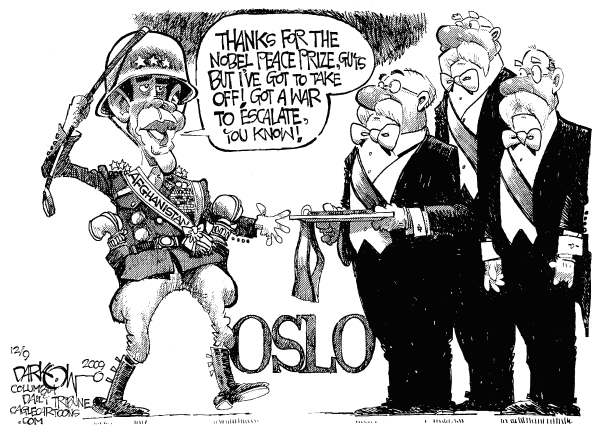Search
Democracy Links
Member's Off-site Blogs
a moral imagination .....

'Where force is necessary, we have a moral and strategic interest in binding ourselves to certain rules of conduct. And even as we confront a vicious adversary that abides by no rules, I believe that the United States of America must remain a standard bearer in the conduct of war.
That is what makes us different from those whom we fight. That is a source of our strength. That is why I prohibited torture. That is why I ordered the prison at Guantanamo Bay closed. And that is why I have reaffirmed America's commitment to abide by the Geneva Conventions.
We lose ourselves when we compromise the very ideals that we fight to defend. And we honour those ideals by upholding them not just when it is easy, but when it is hard.'
President Bushit Obama accepting the Nobel War Prize
and to the reality behind Obama's moral imagination .....
Al-Rabiah's story began when he travelled to Afghanistan in 2001 to provide humanitarian aid, but was caught up in the chaos following the US-led invasion, and ended up in the hands of the US military. What followed was truly shameful.
In Guantánamo, unreliable witnesses - whose unreliability was acknowledged by the authorities - claimed that he had met Osama bin Laden and had provided him with a suitcase of money, and also claimed that he had played a supporting role to al-Qaeda in the battle of Tora Bora, the showdown between al-Qaeda and US-supported Afghan forces in December 2001, when bin Laden escaped into Pakistan.
Under torture, which included, but was not limited to prolonged sleep deprivation - being moved from cell to cell every few hours over a period lasting for several weeks at least, in a program that was euphemistically known as the "frequent flier program" - al-Rabiah finally broke down, inventing a story to please his captors, and dutifully repeating it in 2004 during his Combatant Status Review tribunal, a military review board designed to establish that he had been correctly designated as an "enemy combatant," who could continue to be held without charge or trial.
Although the authorities knew that the witnesses were unreliable, and interrogators and other personnel cast serious doubts on al-Rabiah's story, he was, nevertheless, put forward for a trial by military commission at Guantánamo in November 2008, based on the credible-sounding story he had parroted at his tribunal, and it was only when Judge Kollar-Kotelly was able to review his case that the whole sordid story emerged.
- By John Richardson at 11 Dec 2009 - 8:36pm
- John Richardson's blog
- Login or register to post comments
Recent comments
1 hour 31 min ago
3 hours 23 min ago
3 hours 44 min ago
6 hours 14 min ago
7 hours 19 min ago
7 hours 31 min ago
9 hours 31 min ago
10 hours 31 min ago
11 hours 25 sec ago
1 day 31 min ago